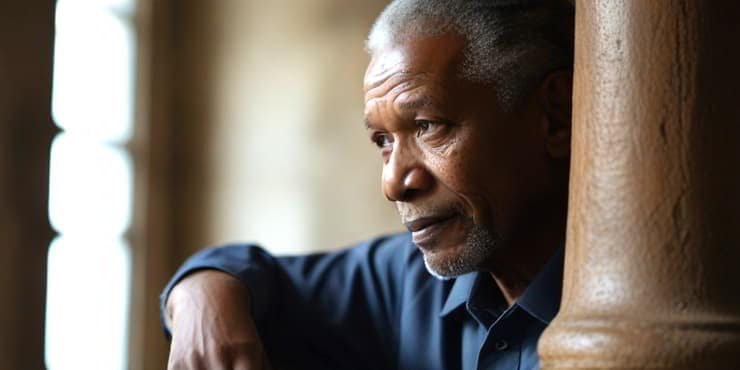Change Behaviour: Make New Habits That Last

Estimated reading time: 7 Min
Want better results long-term? Learn how to change behaviour—shift with triggers, systems, and simple tweaks that stick.
Have you ever found yourself marvelling at the sheer resilience of those who’ve left an indelible mark on history?
In a world that never seems to slow down, the ability to maintain mental fortitude has never been more important.
It’s the unseen force behind every triumph over adversity, every breakthrough after endless trials, and every calm following chaos.
But how does one cultivate this formidable inner strength?
Well, the past holds invaluable lessons for us.
Here we travel through time as we uncover lessons of mental fortitude from some of the greatest minds in history.
Understanding Mental Fortitude
Mental fortitude, often uttered but rarely discussed, are words that describe the unwavering strength that empowers individuals to face life’s adversities with courage and persistence.
In both personal and business development, mental fortitude is an essential state of mind.
It’s the main difference that makes a difference between those who dream and those who achieve what they reach out for.
Transforming challenges into outcomes, and opportunities for growth.
It’s composed of four key components: resilience, grit, optimism, and self-discipline.
Each element plays a significant role in how we face challenges, both personal and professional.
Resilience
Allows us to bounce back from setbacks, viewing failure not as a defeat but as a step towards success.
Grit
Grit is the tenacity that keeps us pushing forward, even when the odds seem stacked against us.
Optimism
Optimism enables us to maintain a positive outlook, fostering the belief that perseverance will lead to desired outcomes.
Self-discipline
Self-discipline is the backbone of mental fortitude, helping us stay focused and on course, even in the face of temptations and distractions.
Historical Perspectives on Mental Fortitude
To grasp the essence of mental fortitude, it helps to look back at the lives of those who’ve demonstrated it.
History is not short of examples of people who faced seemingly insurmountable challenges yet emerged victorious.
By examining their lives, we can distil evergreen lessons on resilience, determination, and strength of will.
- Leonardo da Vinci, a polymath whose relentless pursuit of knowledge and mastery across various disciplines teaches a balance between creativity and discipline,
- Marie Curie was the pioneering scientist who, despite societal barriers and personal tragedies, made ground-breaking discoveries that changed the course of science.
- Nelson Mandela, whose 27 years in prison could not dampen his spirit or deter his fight for freedom and equality, taught us the power of hope and resilience.
- Winston Churchill, the stalwart leader whose resolve and oratory skills bolstered a beleaguered nation during its darkest hour, showcasing the impact of determination and optimism.
- Malala Yousafzai, a beacon of courage, whose advocacy for girls’ education in the face of life-threatening opposition reminds us that strength can come at any age.
Each of these figures faced adversity unique to their times and situations, yet they all displayed an unwavering sense of mental fortitude.
Their stories not only inspire but also offer practical lessons on cultivating resilience, grit, optimism, and self-discipline in our own lives.
Building Mental Fortitude

Having introduced the historical relevance of mental fortitude, it’s clear that this invaluable trait is not reserved for the select few.
Like a muscle, mental fortitude can be developed and strengthened over time with practice and dedication.
Here’s how you can cultivate these qualities, drawing inspiration from the great minds of history.
1. Cultivate Resilience
Like Mandela’s years of imprisonment that led to triumph, life’s setbacks can serve as stepping stones to success.
Embrace failure as part of your growth journey.
When faced with a setback, ask yourself, “What can this teach me?”
This perspective transforms obstacles into opportunities for learning.
2. Develop Grit
Da Vinci’s unyielding quest for knowledge across various fields exemplifies true grit.
Set long-term goals and pursue them with perseverance.
Break these goals into smaller, manageable tasks to maintain motivation and progress, even when the end seems far away.
3. Foster Optimism
Optimism was the catalyst that fueled Churchill’s leadership during the bleakest moments of World War II.
Practice positive thinking and surround yourself with positive influences.
Remember, optimism is not about ignoring reality but about maintaining hope and finding solutions amidst adversity.
It’s about believing you will find a way.
4. Enhance Self-discipline
Marie Curie’s relentless research, often under difficult conditions, showcases the power of self-discipline.
Set clear priorities and establish a routine that aligns with your goals.
Use tools and apps to track your habits and productivity, ensuring you remain focused and disciplined.
5. Seek Continuous Learning
The lives of historical figures teach us that learning never stops.
Embrace curiosity and a love for learning.
Read widely, seek feedback, and be open to new experiences.
Modern Tools and Resources
In today’s age, a plethora of resources are available to aid in developing mental fortitude.
From mindfulness apps like Headspace to educational platforms like Coursera, leverage these tools to build resilience, learn new skills, and stay mentally fit.
The Role of Mental Fortitude: Modern Success Strategies
In today’s world, mental fortitude remains as important as it ever was—perhaps even more so.
Whether navigating the challenges of entrepreneurship, facing the pressures of creative activities, or managing personal trials, the strength of one’s inner resolve can make all the difference.

Entrepreneurship
Just as historical figures overcame their era’s challenges through resilience and innovation, today’s entrepreneurs must possess the mental fortitude to face the uncertainties of the market.
Embracing failure as a learning opportunity and persisting in the face of adversity are keys to building a successful venture.
Creative Pursuits
For artists, writers, and creatives, mental fortitude manifests as the courage to express oneself authentically and the perseverance to continue creating despite criticism or setbacks.
Drawing inspiration from figures like da Vinci, whose creativity knew no bounds, can fuel one’s artistic journey.
Personal Achievement
On a personal level, mental fortitude is about setting and achieving goals that matter to you, whether that’s improving your health, learning a new skill, or fostering meaningful relationships.
It involves pushing beyond your comfort zone, much like Malala’s fight for education rights, to reach new heights of personal development.
Summary
The lessons of history’s great minds are as relevant today as they were in their time.
Building mental fortitude is a journey of developing resilience, grit, optimism, and self-discipline—a journey well worth embarking on.
Let the stories of Leonardo da Vinci, Marie Curie, Nelson Mandela, Winston Churchill, and Malala Yousafzai inspire you to cultivate your inner strength.
As we face our own challenges, let us remember that mental fortitude is not an innate trait but a skill that can be honed.
Start small, stay consistent, and gradually, you will build the resilience and tenacity to navigate life’s ups and downs.
Remember, the power to persevere, to overcome, and to thrive lies within each of us.
Now inspired by the lessons of those who’ve shaped history through their unwavering spirit and determination, let’s take the first step towards building our mental fortitude.
It’s over to you.
Which historical figure’s story of mental fortitude resonates with you the most?
How will you begin to build your mental fortitude today?
Share your thoughts and experiences in the comments below, and let’s inspire each other to grow stronger together.
By engaging with the past and applying its lessons, we prepare ourselves for a future filled with success, no matter what challenges we might face.
Let the journey begin.
😉
Richard
Further Reading and Resources
To further explore the themes of mental fortitude, resilience, and the remarkable lives of the historical figures discussed, here are some recommended books, documentaries, and online resources:
Books:
- “Grit: The Power of Passion and Perseverance” by Angela Duckworth is a compelling exploration of grit as a key predictor of success, filled with inspiring stories and insights on how to build this critical trait.
- “Man’s Search for Meaning” by Viktor E. Frankl outlines Frankl’s experiences in Nazi death camps, his insights into finding purpose amidst suffering, and offers profound lessons on resilience.
- “Leonardo da Vinci” by Walter Isaacson is a biography that provides an exploration into the life of da Vinci, emphasising his insatiable curiosity and unparalleled creativity.
- “Long Walk to Freedom” by Nelson Mandela is Mandela’s autobiography and offers an inspiring look at his journey from imprisonment to the presidency of South Africa, highlighting his indomitable spirit.
Documentaries and films:
- “The Theory of Everything”: This film about Stephen Hawking’s life showcases his resilience in the face of ALS, highlighting his contributions to physics despite his physical limitations.
- “He Named Me Malala”: A documentary detailing the life of Malala Yousafzai, her advocacy for girls’ education, and her recovery from an assassination attempt.
- “Churchill”: Focusing on Winston Churchill’s leadership during World War II, this film captures his determination, wit, and strategic mind.
Online Resources:
- Coursera offers courses on personal development, psychology, and history that can help build knowledge and skills related to mental fortitude.
- TED Talks features inspiring talks by Angela Duckworth on grit, Viktor Frankl on finding meaning, and many others sharing insights into resilience and perseverance.
- The Great Courses Plus provides in-depth video courses on a wide range of subjects, including history, science, and personal development, taught by experts in their fields.
Websites:
- Psychology Today offers articles on resilience, mental health, and personal growth.
- Brain Pickings curates insightful content on creativity, philosophy, and the human condition, often highlighting the wisdom of historical figures.
By exploring these resources, you can gain a broader understanding of the concepts discussed in this article and discover more strategies for building your mental fortitude.






